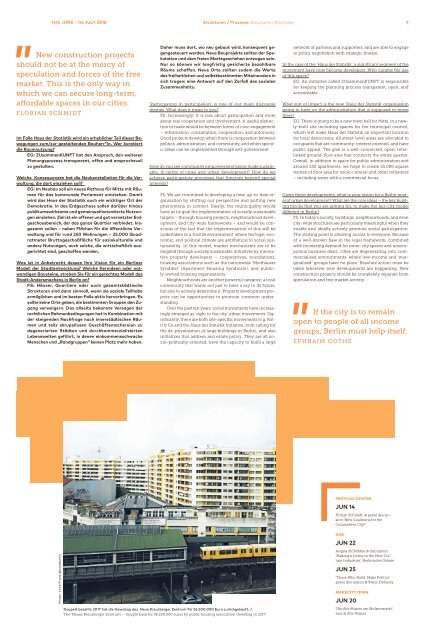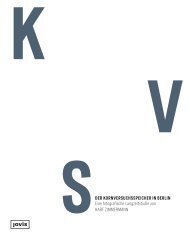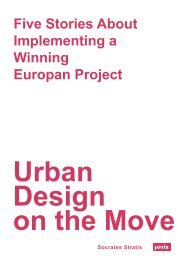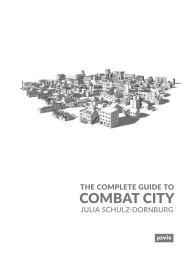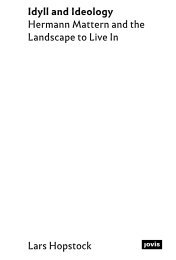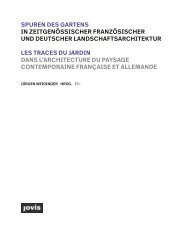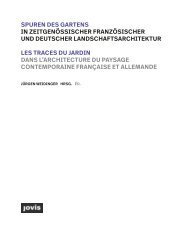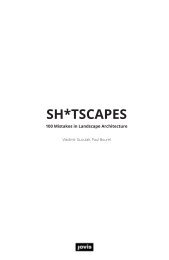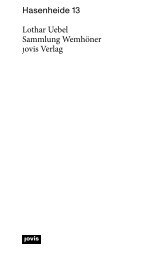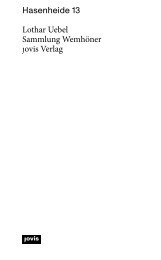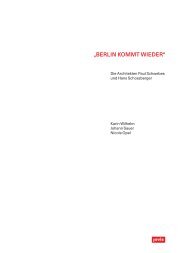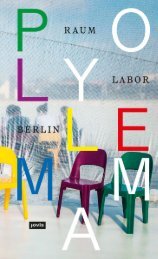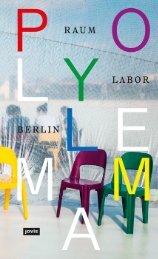Make City 2018 Festival - Newspaper
You also want an ePaper? Increase the reach of your titles
YUMPU automatically turns print PDFs into web optimized ePapers that Google loves.
14th JUNE – 1st JULY <strong>2018</strong><br />
Strukturen / Prozesse Structures / Processes<br />
9<br />
New construction projects<br />
should not be at the mercy of<br />
speculation and forces of the free<br />
market. This is the only way in<br />
which we can secure long-term,<br />
affordable spaces in our cities.<br />
FLORIAN SCHMIDT<br />
Im Falle Haus der Statistik wird ein erheblicher Teil dieser Bewegungen<br />
zum/zur gestaltenden Bauherr*in. Wer kuratiert<br />
die Raumnutzung?<br />
EG: ZUsammenKUNFT hat den Anspruch, den weiteren<br />
Planungsprozess transparent, offen und anspruchsvoll<br />
zu gestalten.<br />
Welche Konsequenzen hat die Neukonstellation für die Verwaltung,<br />
die dort einziehen soll?<br />
EG: Im Neubau soll ein neues Rathaus für Mitte mit Räumen<br />
für das kommunale Parlament entstehen. Damit<br />
wird das Haus der Statistik auch ein wichtiger Ort der<br />
Demokratie. In das Erdgeschoss sollen darüber hinaus<br />
publikumswirksame und gemeinwohlorientierte Nutzungen<br />
einziehen. Ziel ist ein offener und gut vernetzter Erdgeschossbereich,<br />
der das ganze Quartier verbindet. Insgesamt<br />
sollen – neben Flächen für die öffentliche Verwaltung<br />
und für rund 250 Wohnungen – 25.000 Quadratmeter<br />
Bruttogeschoßfläche für soziokulturelle und<br />
andere Nutzungen, auch solche, die wirtschaftlich ausgerichtet<br />
sind, geschaffen werden.<br />
Was ist in Anbetracht dessen Ihre Vision für ein Berliner<br />
Modell der Stadtentwicklung? Welche Kernideen oder notwendigen<br />
Bausteine, streben Sie für ein gerechtes Modell des<br />
Stadt-Andersmachens in Berlin an?<br />
FS: Häuser, Quartiere oder auch gesamtstädtische<br />
Strukturen sind dann sinnvoll, wenn sie soziale Teilhabe<br />
ermöglichen und im besten Falle aktiv hervorbringen. Es<br />
sollte keine Orte geben, die bestimmten Gruppen den Zugang<br />
verweigern. Das allseits bekannte Versagen der<br />
rechtlichen Rahmenbedingungen hat in Kombination mit<br />
der steigenden Nachfrage nach innerstädtischen Räumen<br />
und teils skrupellosen Geschäftemachereien zu<br />
degenerierten Städten und durchkommerzialisierten<br />
Lebenswelten geführt, in denen einkommensschwache<br />
Menschen und „Randgruppen” keinen Platz mehr haben.<br />
Daher muss dort, wo neu gebaut wird, konsequent gegengesteuert<br />
werden. Neue Bauprojekte sollten der Spekulation<br />
und dem freien Marktgeschehen entzogen sein.<br />
Nur so können wir langfristig gesicherte bezahlbare<br />
Räume schaffen. Neue Orte sollten zudem die Werte<br />
des freiheitlichen und selbstbestimmten Miteinanders in<br />
sich tragen: eine Antwort auf den Zerfall des sozialen<br />
Zusammenhalts.<br />
‘Participating in participation’ is one of our main discourse<br />
themes. What does it mean to you?<br />
FS: Increasingly, it is less about participation and more<br />
about real cooperation and involvement. A useful distinction<br />
to make would be between forms of civic engagement<br />
– information, consultation, cooperation, and autonomy.<br />
Good projects develop when there is cooperation between<br />
politics, administration, and community, and when specific<br />
ideas can be implemented through self-government.<br />
How do you see community empowerment being made sustainable,<br />
in terms of cities and urban development? How do we<br />
achieve participatory processes that function beyond special<br />
interests?<br />
FS: We are committed to developing a new, up-to-date organisation<br />
by shifting our perspective and putting new<br />
phenomena in context. Ideally, the municipality would<br />
have as its goal the implementation of socially sustainable<br />
targets – through housing projects, neighbourhood development,<br />
and city-wide frameworks – and would be conscious<br />
of the fact that the implementation of this will be<br />
undertaken in a ‘hostile environment’ where the legal, economic,<br />
and political climate are antithetical to social sustainability.<br />
In this model, market mechanisms are to be<br />
negated through socially sustainable initiatives by innovative<br />
property developers – cooperatives, foundations,<br />
housing associations such as the nationwide ‘Miethäuser<br />
Syndikat’ (Apartment Housing Syndicate), and publicly-owned<br />
housing organisations.<br />
Neighbourhoods are another powerful category; a local<br />
community that wants not just to have a say in its future,<br />
but also to actively determine it. Property development projects<br />
can be opportunities to promote common understanding.<br />
Over the past ten years, social movements have increasingly<br />
emerged as ‘right to the city’ urban movements. Significantly,<br />
there are both site-specific movements (e.g. Kotti<br />
& Co and the Haus der Statistik Initiative, both calling for<br />
the de-privatisation of large buildings in Berlin), and also<br />
initiatives that address real estate policy. They are all socio-politically<br />
oriented, have the capacity to build a large<br />
network of partners and supporters, and are able to engage<br />
in policy negotiation with strategic finesse.<br />
In the case of the ‘Haus der Statistik’, a significant segment of the<br />
movement have now become developers. Who curates the use<br />
of this space?<br />
EG: An initiative called ZUsammenKUNFT is responsible<br />
for keeping the planning process transparent, open, and<br />
accountable.<br />
What sort of impact is the new ‘Haus der Statistik’ organisation<br />
going to have on the administration that is supposed to move<br />
there?<br />
EG: There is going to be a new town hall for Mitte, in a newly-built<br />
site including spaces for the municipal council,<br />
which will make Haus der Statistik an important location<br />
for local democracy. All street-level areas are allocated to<br />
occupants that are community-interest oriented, and have<br />
public appeal. The goal is a well-connected, open, interlinked<br />
ground-floor area that connects the entire quarter.<br />
Overall, in addition to space for public administration and<br />
around 250 apartments, we hope to create 25,000 square<br />
metres of floor area for socio-cultural and other initiatives<br />
– including some with a commercial focus.<br />
Given these developments, what is your vision for a Berlin model<br />
of urban development? What are the core ideas – the key building<br />
blocks that you are aiming for, to make the fair-city model<br />
different in Berlin?<br />
FS: In today’s society, buildings, neighbourhoods, and even<br />
city-wide structures are particularly meaningful when they<br />
enable and ideally actively promote social participation.<br />
The starting point is allowing access to everyone. Because<br />
of a well-known flaw in the legal framework, combined<br />
with increasing demand for inner-city spaces and unscrupulous<br />
business deals, cities are degenerating into commercialised<br />
environments, where low-income and ‘marginalised’<br />
groups have no place. Resolute action must be<br />
taken wherever new developments are happening. New<br />
construction projects should be completely separate from<br />
speculation and free market activity.<br />
If the city is to remain<br />
open to people of all income<br />
groups, Berlin must help itself.<br />
EPHRAIM GOTHE<br />
FESTIVAL CENTRE<br />
JUN 14<br />
Florian Schmidt, @ panel discussion<br />
‘New Coalitions for the<br />
Cooperative <strong>City</strong>?’<br />
Photo: Lena Frank @lenasberlin<br />
Doppelt bezahlt: 2017 hat die Gewobag das Neue Kreuzberger Zentrum für 56.500.000 Euro zurückgekauft. /<br />
The ‘Neues Kreuzberger Zentrum’ – bought back for 56,500,000 euros by public housing association Gewobag in 2017.<br />
HUB<br />
JUN 22<br />
Angela McRobbie @ discussion<br />
‘Making a Living in the New Culture<br />
Industries‘, Berlinische Galerie<br />
JUN 25<br />
‘Those Who Build, <strong>Make</strong> Politics’,<br />
panel discussion @ Swiss Embassy<br />
MAKECITY OPEN<br />
JUN 20<br />
‘Die Alte Münze am Molkenmarkt’,<br />
tour @ Alte Münze


